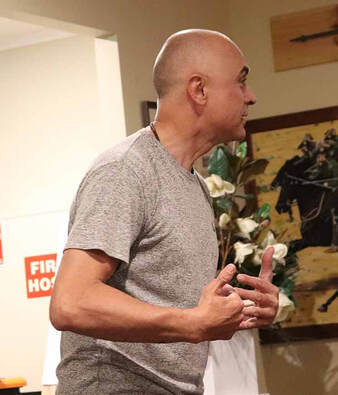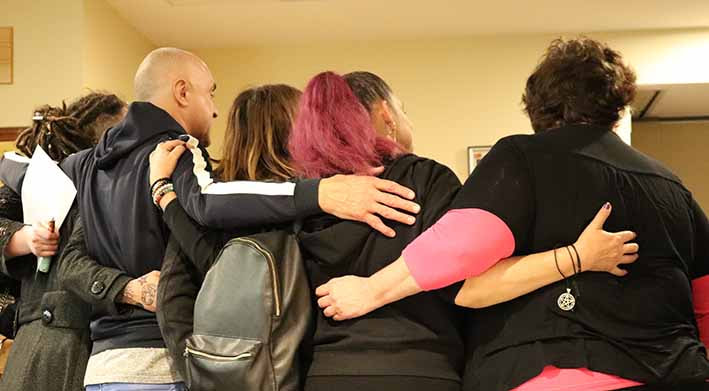 Wayne Schwass: “I absolutely believe in the value and benefits of authentic, genuine conversations about mental health, emotional well being and suicide prevention. We need to make them available to every person.” Photo: Geoff Ellis
Wayne Schwass: “I absolutely believe in the value and benefits of authentic, genuine conversations about mental health, emotional well being and suicide prevention. We need to make them available to every person.” Photo: Geoff Ellis WITH one eye on a clock racing toward the 9pm lights out, I clutch my clipboard and take a deep breath.
Wayne Shwass is in full flight, Beau Vernon’s sitting amongst 100 people on the edge of their seats and I’m about to become famous as that guy who made Wayne Schwass shut up.
Local psychologist Terry Melvin, who cofounded the MensLine Australia phone service, had kicked off the event three hours earlier. As MC, I welcomed everyone in the Phillip Island RSL Anzac Room and explained why we were there on a Friday night. The room was full of people who were starting a conversation about preventing suicide.
Many of us have been touched by people taking their own lives. Most of us want to do more. We’re just not sure how.
That’s what this forum was about. Many people believe that saying nothing is the safest way to help someone who has lost all hope.
People worry about using the wrong words. Or making things worse when talking to someone who could be thinking of taking their own life.
Words, any words, can help to lift someone. Caring conversations matter and you don’t need to be an expert; you just need to be there for them.
In 2018, Beyond Blue released a report, based on conversations with experts and a survey of over 3000 people from all walks of life.
Those 3000 people included people who had not been affected by suicide, people who had been touched by suicide and people who had attempted suicide.
The key message from this report is that having someone listen with empathy and care and offers of support is a bridge across the abyss of hopelessness.
Though the evening evidence of what works was presented to an enthusiastic group of people who explored how to apply this knowledge within our community.
“Everyone has their ups and downs,” Beau Vernon said during an on-stage interview. “I want to help people so that they can live the best life they can, no matter the situation.”
The senior coach of the premiership-winning Phillip island Football Club spoke about life after the spinal cord accident that left him a quadriplegic. Rehab, physio and the moment he was alone in a room, not even able to turn the page of a book. That mobile phone was well out of reach. He spoke about the support from his family, friends and his football family that got him across the low points. His wife was an essential part of that support and he can't thank her enough.
AFL legend Wayne Schwass enrolled everyone in his journey to becoming a mental health advocate. Schwass came out as having depression back in 2006, when sportsmen hid their frailties. Here he was an incoming tide of words. This was the ninth event he had spoken at during the week, with a weekend ahead of him. That’s one small measure of his commitment.
He explained the cruel “boys don’t cry” ethic imprinted on his young mind and cited that as the start of a journey that saw him taking the field with three mental health issues and the effects of self-medication. It became a self-fulfilling downward spiral.
Wayne gave us permission to cry. "Every emotion is a good emotion," he said.
One thing that was re-enforced through-out the evening was some simple discussion protocols around suicide. Basically, when talking about suicide, we need to avoid graphic depictions and idealisation.
This forum focused on community capacity building rather than treatment and service provision. It was held under the banner of the Bass Coast Suicide Prevention Project.
It has started a conversation to build a community safety net that will help to prevent suicide and concluded with white boards full of potential.
Did we make the 9pm curfew? Nearly. We respectfully paused for the ode, "Age shall not weary them ..." then resumed the discussion. People drifted away until Mick Green turned off the lights well after 10pm. Those conversations continue to grow.
More info? Visit www.beyondblue.org.au/the-facts/suicide-prevention.
